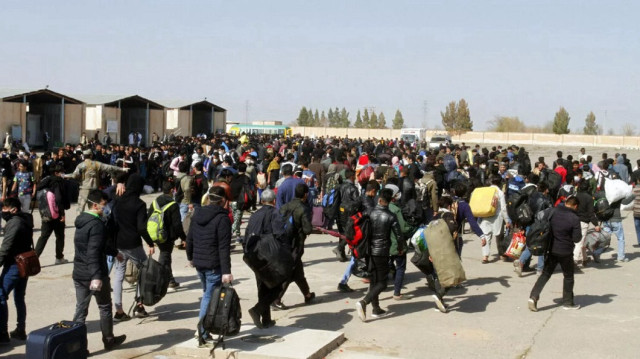EU's Plan for 'Safe' Countries Sparks Migration Debate
The European Union's new list of 'safe' countries aims to streamline asylum processes and expedite deportations, but it has ignited significant controversy among human rights groups.
Published April 18, 2025 - 00:04am

Image recovered from arabnews.com
The European Union is set to tighten its migration policies by publishing a list of seven countries designated as 'safe' nations of origin. This move, aimed at facilitating quicker deportations, was announced amidst growing public pressure to curb irregular migration and streamline asylum procedures. On this list are Egypt, Morocco, Tunisia, Kosovo, Bangladesh, Colombia, and India, reflecting the EU's focus on ease of return from these countries.
The European Commission explains that this action is intended to support member states that are struggling with a backlog of asylum applications. Magnus Brunner, the EU commissioner for migration, emphasized that it is crucial to enact measures that promote faster asylum decisions, given the fermenting public opinion on migration issues which have influenced electoral outcomes in various EU nations.
While the list aligns with broader EU strategies, it has not been without its detractors. Rights groups have raised concerns that designating these countries as 'safe' could lead to potential human rights violations. EuroMed Rights, for instance, criticized the list, highlighting the documented human rights abuses in some of these nations, suggesting that labeling them as 'safe' may endanger asylum seekers.
Some member states already have their own lists of 'safe' countries; for example, France includes Mongolia and Serbia on its list. This EU initiative seeks to harmonize such rules across the bloc, although member states can add but not remove nations from the EU's list. The effort, however, still requires approval from the European Parliament and the member states to come into effect.
Italy, under Interior Minister Matteo Piantedosi, expressed strong support for the policy, hailing it as a triumph for Italian governance. The policy comes against a backdrop of decreases in irregular border crossings, with the EU reporting a 38% drop in 2023, yet demands for halting irregular migration remain a high priority.
The initiative is part of a larger context involving the acceleration of the EU's Migration and Asylum Pact, which anticipates implementing key aspects by June 2026. By allowing quicker processing, potentially in as little as three months, the EU hopes to manage cases expected to have low chances of successful asylum outcomes swiftly.
Nonetheless, the criterion for maintaining a country on this 'safe' list includes ongoing assessments of conflict situations and asylum acceptance rates that exceed 20%. Human Rights organizations, including Amnesty International, argue that these presumptions risk undermining individualized assessments critical to the EU's asylum framework, potentially marginalizing vulnerable groups such as political dissenters and journalists.
As the EU attempts to unify and refine its approach to migration, diverse opinions continue to fuel an ongoing debate about the ethics and efficacy of such measures and their impacts on human rights. Moving forward, the EU must balance the necessity for efficient migration control with its fundamental commitments to human rights and humanitarian principles.






